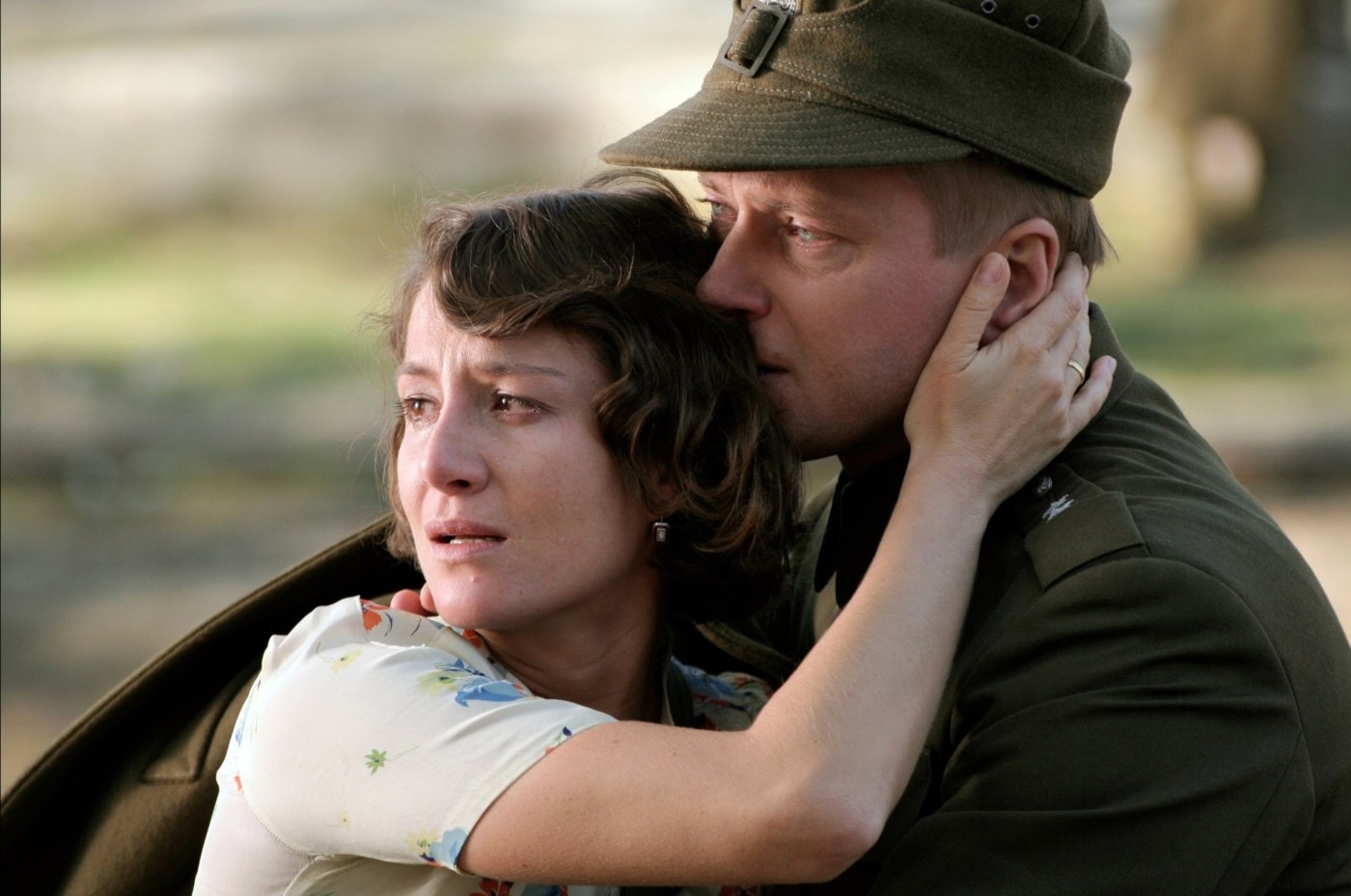By Chlotrudis Independent Film Society
Rating: 4 cats
Director: Adrzej Wajda
Starring: Andrzej Chyra | Artur Zmijewski | Danuta Stenka | Jan Englert | Maja Ostaszewska

Original language title: Katyń
Country: poland
Year: 2009
Running time: 121
IMDB: http://www.imdb.com/title/tt0879843/
Jason says: “The title of KATYN refers to a place name and an event, one which looms large in modern Poland’s history, but the film holds the actual event in reserve. It’s too big, after all, putting Katyn at it’s actual chronological place in history might blot out everything around it, and as horrific a massacre as it was, the violence of the incident is not the sole thing about it which is horrible.
“Even in the middle of World War II, the Soviet Union was playing the long game. Poland, positioned between the Soviets and the Germans, got it from both sides. As the film opens in 1939, the two armies meet in Krakow, but their commanders shake hands rather than fight right off. Anna (Maja Ostaszewska) and her daughter Nika are seeking Anna’s husband Andrzej (Artur Zmijewski), an officer in the Polish army. While the Nazis are closing down the university and rounding up the faculty – including Andrzej’s father Jan (Wladyslaw Kowalski) – the Soviets are doing the same with the Andrzej and the other officers, including Andrzej’s friend Jerzy (Andrzej Chyra). Many are slaughtered by the Soviets at Katyn in 1940. In 1945, as the war ends, the Soviets take control of Poland, and insist that the massacre was perpetuated by the Germans in 1941. Everybody knows this to be false, but if the Soviets punish anyone who says otherwise, what will the historical record say?
“Writer/director Adrzej Wajda lost his father at Katyn, but does not make the film entirely about that specific incident. KATYN is a turning point, a nexus which is horrible enough in its own right, but which is also part of a pattern. KATYN serves as an examination of how fascist states take and consolidate power, especially for the long haul. Methodical destruction of the army is only part of it; information control is just as important, if not more so. The first half of the movie details how the Nazis and Soviets sapped Poland’s strength by removing its intellectuals and army’s officer corps; the second shows the Soviets consolidating power, entrenching a lie through sheer repetition and suppression.
“The way KATYN shows both the lead-up to the incident and the aftermath is engrossing; Wajda does a great job of balancing procedural details with emotionally intense vignettes. The film frequently makes small jumps forward in time, but in the middle it makes a big one, from the middle of the war to the end (roughly 1940 to 1945; in the print shown, there is some unsubtitled text to bridge the gap). The risk is that Katyn can wind up feeling like two hour long movies glued together, especially as the second half introduces new characters – like Andrzej’s nephew Tadeusz (Antoni Pawlicki) and Agnieszka (Magdalena Cielecka), the sister of one of the prisoners – and new stories to go with them. It’s suddenly more people to keep track of, and stories that don’t always directly connect with the first hour’s, even if the themes do.
“It’s not a fatal flaw, or close to one; the new stories are as good as the ones we started with, and that’s quite good indeed. Wajda does a great job of building each individual tale and tying them together without giving the feeling that Katyn only affected a small group of people. More important is the overall mood; everything from the cinematography to the reconstruction of the city contributes to the feeling of Poland being squeezed. It is a thoroughly created atmosphere of despair; even the knowledge we in the present have that Poland would endure and come out the other end of history well does not completely offset the feeling of the time.
“The actors help offset that feeling a bit. They don’t play their characters as particularly cheerful, but do generally manage to accentuate their virtues and determination without making them appear fools or or especially quixotic. Despite being separated for the bulk of the movie, Artur Zmijewski and Maja Ostaszewska show a strong bond as Andrzej and Anna; enough so that we don’t really need their early scene together to see that, although we’re glad to have it. Among the prisoners, Jan Englert plays a general who does well inspiring the troops, and Andrzej Chyra is very good as the loyal, but cynical, lieutenant. The second-half characters often serve as a breath of fresh air, compared to the likes of Anna and Jerzy, who seem broken by a war that never seems to have ended for them. Magdalena Cielecka brings steely determination as well as beauty, while Antoni Pawlicki and Agnieszka Kawiorska play their characters as a little less jaded, still seeing resistance against the Communists as an adventure as well as a good fight.
“They’d think differently if they saw the execution of the Katyn massacre, which is depicted with a brutality usually reserved for Nazi atrocities. In some ways it’s more intense, as it is individual as well as efficient. It’s a suitably sobering end to the film; the final demonstration of how far an authoritarian state will go maintain their power, even if they’ll later deny it. 4 cats
“Seen 4 June 2009 at the Brattle Theatre (Special Engagement)“
